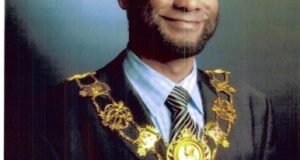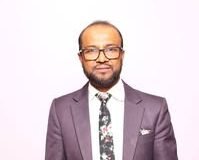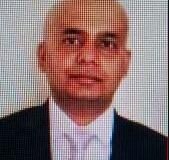Islamism in the Horn of Africa
Dr. Mozammel Haque :
 A discussion on the topic “Islamism in the Horn of Africa” took place at Chatham House, London, on Wednesday, 13th of May, 2015, where following speakers participated and spoke: Dr. Harry Verhoeven from the Georgetown University School of Foreign Service in Qatar, Sideq Osman, Sudanese Affairs Researcher; Professor Justin Willis from the Department of History, Durham University and Jeson Mosley, Associate Fellow, African Programme, Chatham House. This event was chaired by Dame Rosalind Marsden, Associate Fellow, African Programme, Chatham House.
A discussion on the topic “Islamism in the Horn of Africa” took place at Chatham House, London, on Wednesday, 13th of May, 2015, where following speakers participated and spoke: Dr. Harry Verhoeven from the Georgetown University School of Foreign Service in Qatar, Sideq Osman, Sudanese Affairs Researcher; Professor Justin Willis from the Department of History, Durham University and Jeson Mosley, Associate Fellow, African Programme, Chatham House. This event was chaired by Dame Rosalind Marsden, Associate Fellow, African Programme, Chatham House.
Dr. Harry Verhoeven
Dr. Harry Verhoeven from the Georgetown University School of Foreign Service in Qatar spoke on Water Civilization and Power in Sudan which tells the story from inside of the last 25 years in Sudan. The revolution started on 13th of June 1989. Dr. Verhoeven said, “I think it is particularly interesting and timely to look as the experience of Sudan at the time when so many people are asking the questions about Islamism in the Arabian Peninsula in the Gulf broadly in North Africa …”
In Sudan, according to Dr. Verhoeven, “Islamists had been in power for quarter of a century and the kind of policies they have pursued in a range of different domains and see what we can say to the extent of and this may be generalizable.” He was of the opinion that because of the particular perceptions of the Sudanese experience Islamism in the Horn of Africa has a very different future and perhaps not much the future at all in this region as compared to other parts of the continent or broader Arab-Islamic world for that matter.”
There was lot of focus now-a-days in the media as well as the academic literature on the idea of Shariah, on Jihad on the struggle of the SBLA, on the secession of the south, on the conflict of Darfur; all of these are I will argue the important manifestations of the state for the best or worse of the experiences since 1989 has made. “But what we have lost sight of is the way in which the regime and the government have managed to maintain power for 25 years or more,” he said.
It is important to remind ourselves the very particular nature of Islamism in the Sudanese context said Dr. Verhoeven. He mentioned, “In the 1960s and 1970s Islamism in Sudan by and large was an elitist project. It was a project that was profoundly influenced by the interaction between the Islamists on the one hand and another very progressive status quo proactive challenging group in Sudan which is group of Marxists, Leninists and Communists. And both Islamists and Communists thought in very similar terms what is wrong with the Sudanese society and though the solution they offered seemed to differ quite a bit; in reality both believed fundamentally material transformation of Sudan that is the same way which the Sudanese raised their way with each other in an economic sector is an absolutely essential to live up to the aspirations that many of the Sudanese people at independence.”
“In 1989 when this government came to power it focus very much perhaps much later for many people, internally called economic salvation. Dr. Hasan al-Turabi outlined the four goals of the revolution at economic salvation actually the second most important of all the aspirations of the new regime aspire to,” Dr. Verhoeven said and added, “If you remember that this regime came to power in between two famine years 1988 and 1989 – the two famine years – immediate about Sudan outside world associated with hungry people of the peripheries and the huge shortage of all kinds of basic foods in Khartoum. And so the idea is that this regime had to deliver economically had to have more food on the table than anyone done before in the humane ideas you should tolerate to deliver on this aspect of political economic legitimacy which is a very central idea.”
Dr. Verhoeven mentioned about the big power-struggle in the mid-1990s. He said, “Many of you know this power struggle between this many of this two Islamists and the army Omar Bashir and Ali Osman al-Taha and between the Hasan Al-Turabi, the political God-father of the Islamist wings of the regime. And what happened at the end of the power struggle President Bashir and Ali Osman al-Taha won this power struggle. And in order to rebrand themselves and in order to reform themselves the 2000 onwards become the new build idea the so-called competent agenda.”
“You want to make sure that the people like Hasan Turabi is very dangerous ideas to exporting revolution are not coming back and that is why you all provided with the money in order to transformation. And in the book I described huge amount of foreign capital and also huge amount of oil money that Sudan start generating from 1999 onwards essentially went to three big part of expenditure:,” Dr. Verhoeven mentioned about how the money were spent. “The first, increasing the budget for the army and security services who are two and four stars of the capital they deserved; secondly it went on renovating government building on increasing loans salaries and again against that was felt overdue and essential to ties to the government because the government always felt it was never quite government hands on the bureaucracy. and thirdly and most importantly it should huge amount of money went to so-called agricultural rival Sudan dam programme and Ethiopia launch that dam programme and the Sudanese dam programme was the largest Africa had ever seen. More than 10 billion US dollars over the last four years had flowed on and to the dam programme in an attempt to hydro-engineering if you like Sudan is in debt have been a poor country and economic basket case in the mind of the outside world to live once again up to the state of as the bread basket of Africa.”
In the words of one of the interviewee in the book, Abdur Rahim Hamdi and one of the ideologists argued, “They don’t want to drink our oil they want to eat our wheat.”
While drawing his conclusion, Dr. Verhoeven said, “Unfortunately, the second gamble I will argue has not paid off. And part of the problem the government has been facing today is in order to involve the south today for the third time it is essentially out of ideas. And for that very reason I think many people in the South will both on the ideological side and on the economic side failure and this is something which has been picked up by many of the countries around the Sudan. I think Islamism and for that reason Islamism in the Horn of Africa does not necessarily have much of the future.”
Professor Justin Willis
Professor Justin Willis of the Department of History of Durham University, first of all, started with the definition of Islamism. He said, “What is Islamism?” and immediately replied, “Islamism, as I am talking about, is the idea Islam should guide the political life as well as the domestic life of Muslims and this should be near to goal the political and social transformation. Islamism is not necessarily rival movement, certainly a no Muslim state and in some Muslim wants it is an irreconcilably opposed to existing political order. Islamism as I understand, is not necessarily doctrinal in nature.”
“I am ideally assumed Islamism is cognate often as Salafism as it is doctrinally believed. This is useful role of Islam is in some degree self-enforcing certainly in Kenya, but it is not always necessarily the case, not all Salafists pursued Islamist political agenda; it is not in the main term not always perceived Islamist agenda,” he said.
Professor Willis enquired what is the story in Kenya. Now it is called Islamism as told in Kenya which is essentially based on external influence and it is often born and started with account of programme of proselytization. He said, “They always intended to reform Islam; The existing Islam the practice of Islam is often deficient and they intended to be always associated with the notion this practice of prosetilyzation and reform should have political angle and it should remind Muslims it is their duty to prime possibility of living proper life as Muslims in the society as political goal as well as religious goal.”
Professor Willis then talked about the influence of modern technologies. He said there is a “new kind of engagement by the debates on Islam and its place in society which are considerably technologically, I suppose, made possible or change new technologies where once audio-cassettes circulating sermons, then CDs, DVDs followed and now the internet offers that. internet online videos; webs, blogs, cyberspaces. The whole new world of engagement has encouraged Muslim community in Kenya to think themselves to be part of the wider Muslim community and in many cases and not in all to understand that Muslim community has engaged in world-wide struggle against forces which are fundamentally inimical to it and the duty of all Muslims to resist.”
Professor Willis also mentioned about Somalia and said, “Influences externally has forced significantly affected past two and half decades in Somalia which significantly changed Kenya both demographically and quickly economically bringing a new wave of Muslim population and displaced people from Somalia and also changing Nairobi and other neighbouring Kenyan towns and changing overall the composition of Kenyan Muslim population. Probably something likes 11-12 per cent of population.”
“These events in Somali also caused brought to the Kenya’s doorsteps the very vivid picture of conflict which many people like to see as one aspect of the struggle between the global enemies of Islam and Islam itself,” mentioned Professor Willis.
Professor Willis also mentioned some significant internal element. He said, “All of these external forces involved in the rise of Islamism in Kenya but there are also significant internal element not really inseparable Linda pointed out recently in her report.”
Talking about the affluence of Kenya, Professor Willis mentioned, “Since independence Kenya has emerged as an affluent state in a number of ways. The part of the country which is populated by and which has significant Muslim population is in the northeast and some of the parts of the country in terms of wealth, health and education. Muslims seem themselves not without reason is being politically excluded and particularly vulnerable of abuses by state officials. This is especially so for the Kenyans of Somali origin but it is also true for the Muslims more generally.”
Professor Willis argued, “That sense of grievance, that sense of exclusion and marginalisation, I think it has become part of the story of Islamism in Kenya. In the early 1990s that sense of Muslim grievance was part of the mobilising power of what was then Islamic party of Kenya and I think it is significant. The Islamic party of Kenya was part of a wider political reform movement in Kenya and used its youth Islam is its mobilising object and logic. It was not in itself consistently or coherently Islamist party in its nature. There are many people in RPK who at least very publicly presentable what they are doing as part of the pluralistic struggle for a political state mobilising using Islam but not within Islamist agenda of transforming completely Muslim society. But it is also instinctive to know that many former RPK members involved in parliamentary or electoral politics of Kenya of the years and continued they are.”
Professor Willis also spoke about RPK and Al-Sabab in Kenya, He mentioned about their leaders and radical preacher of the late 1990s. Talking about Christianity movement, Professor Willis mentioned, “Christianity movement in Kenya which RPK have been involved became increasingly divided into a long religious line. This is also important to understand; whereas in the early 1990s Christianity has been an important part of Christianity reform movement in Kenya. Since the end of 1990s, Christianity has largely been dropped out of that campaign of constitutional political And in fact I think it is reasonable to argue Christianity has been cooperated into something like an establishment political culture in Kenya. Established political figure used Church as part of their political performance prayed for and blessed by Church leaders but the Church is not to decide for radical fatigue of the Kenyan state. Islam, on the other hand, has continued to provide space for challenge and some of the state for the remarkable constitutional or electoral form to a variety of organisations and a variety of individuals who are called a kind of peaceful election engagement which are mobilised around Islam which are in other words electoral constitutional peaceful.”
Professor Willis also said, “Some people have put forward what is very much the kind of al-Sabab line; that the line which said, that the struggle for the poor in Kenya is the struggle of the Muslims in Kenya, and the struggle of Muslims in Kenya is the struggle of Muslims internationally against the oppression and they are the enemies of the poor and the oppressed of the world. And Muslims should struggle against them. The online publication of the Al-Sabab Kenya consistently persue this message putting forward on the glossy publications linked to the Black American coming to Islam in the ghettos of America and stories from the frontline ISIS and Iraq and Syria and stories from Kenya about dispossession of the Muslims. This is a story about how Islam is on the side of poor and oppressed and all Muslims should rally to an international struggle which is against the oppression and domination of capitalism.”
Professor Willis also mentioned, “Terrorism seeks to divide to delegitimize other form of political actions and polarise and some degree of course that campaign has been successful in Kenya. One of the other consequences of the event in the last two years has been to make it increasingly difficult for Muslim leaders to pursue a few kind of political engagement which is alternative line of representation leadership of the Muslim community in Kenya has always been contested. This is partly been on racial and ethnic lines divide between Somali non-Somalis between Africans and Arabs.. There has been multiple line which never been single effective voice”
 Weekly Bangla Mirror | Bangla Mirror, Bangladeshi news in UK, bangla mirror news
Weekly Bangla Mirror | Bangla Mirror, Bangladeshi news in UK, bangla mirror news






